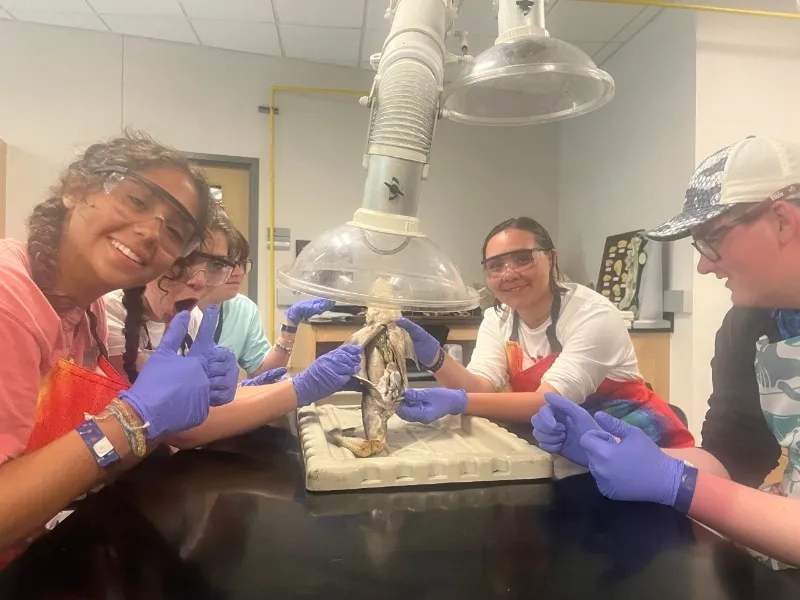What Classes Are Required in College in 2025?


Explore what classes are required in college. There are electives, general education requirements, and major-specific requirements.
Attending college is an exciting and transformative experience, but it's also a time of decision-making. At most universities, you'll encounter a combination of general education courses, major-specific requirements, and elective options, though, unlike high school, physical education is not usually required. So, understanding the classes required to complete your degree is a crucial aspect of your college journey. Which is where we come in.
Today's article will explore the various requirements you can expect to encounter and how they shape your academic path. We will discuss everything from general education courses to the impact your courses may have on your career.
Apply for scholarships to help pay for the classes you need to take!
At Bold.org, we recognize the importance of navigating your course requirements effectively to manage both your academic and financial college journey. Our team is here to guide you through understanding these requirements and finding scholarship opportunities to support your path. Let's dive in!
Get Matched to Thousands of Scholarships
Create your Bold.org profile to access thousands of exclusive scholarships, available only on Bold.org.
Create Free ProfileGeneral Education Courses
General education classes, or core classes, form the backbone of your college education. The core curriculum exposes you to subjects outside of your major to provide you with a well-rounded educational foundation. Topics of core courses may include mathematics, social sciences, humanities, and communication skills.
Though you may be reluctant to take communications or humanities classes if you feel unskilled in these areas of study, the writing and analysis skills you'll gain through such coursework are transferable to any career. You'll acquire a broad knowledge base that fosters critical thinking, communication, and problem-solving skills—all essential attributes in today's job market.

Typically, you can pick from a litany of courses at your school to fulfill categorical gen ed requirements like social sciences or natural sciences, as these requirements are measured by credit hours rather than by course.
For example, in a social sciences general education course, you might explore the history of social science concepts, learn about different theories and their applications across sociology, psychology, anthropology, and political science, or take a more specialized course in one of those related fields.
Through such gen ed coursework, you will develop a deeper understanding of human behavior and societal structures, as well as strong analytical and writing skills. Likewise, a broader natural science course, a basic biology class, or a specific environmental science seminar might all count towards the natural sciences requirement.
Nowadays, many colleges require public speaking courses to ensure that college students are prepared for any speaking requirements in school and beyond. Though it can seem daunting to speak in front of other students, taking at least one course in public speaking during your educational journey will greatly improve your confidence in both academic and professional settings.
Browse our scholarship search feature to find scholarships for your major today!
First-Year Seminars
Many universities offer specialized first-year seminars for new students or transfer students as a part of the general education curriculum. These required courses usually exist to bring students' writing skills up to speed while serving as a prerequisite for more advanced coursework.
Most colleges will require new students and transfer students to choose from a lineup of first-year courses that cater to different special interests while assigning similar research-driven or creative writing assignments.
Many first-year seminars are like a hybrid between a writing course and a gen ed course, such as history classes or STEM classes. These first-year seminars are a great way to make friends at your school while polishing your writing skills at the college level.
Foreign language
Foreign language class requirements vary according to your school and field of study. Colleges generally waive language requirements with proof of proficiency in a foreign language, either through AP coursework or high performance on a school's placement test.
If you cannot waive the requirement, you may need to take anywhere from one to four semesters' worth of credit hours in a foreign language. Consult your academic adviser for the requirements specific to your program and recommendations on what language to take in order to fulfill your academic and professional goals.
Basic Math and Science
Sufficient credit hours in some form of basic math and science are almost always required to graduate college. This is because math skills are essential to making smart financial decisions as an adult. Most colleges accept AP credit and standardized test scores to waive prerequisites to higher-level coursework or to waive these requirements entirely.
For some degree programs, you may only need to take one course in STEM, while for other majors, you may need to take multiple courses toward this requirement. Check with your academic advisor to confirm the requirements according to your situation.
Occasionally, a school offers online programs that are self-paced to fulfill STEM requirements. This can be helpful if you are already taking a full schedule and do not want to devote any more classroom time to requirements outside of your major. An online program is also great for students who commute and live far from their college campus.

Major-Specific Course Requirements
Once you've fulfilled general education requirements, you'll start diving into coursework specific to your chosen field of study. Major-specific classes target the subject area you intend to specialize in, such as biology, psychology, or business.
Each major has its own set of core classes that form the foundation of your knowledge in that field. This curriculum is designed to equip you with the skills and expertise necessary to excel in your chosen career.
For instance, if you're pursuing a major in biology, you might take courses in genetics, ecology, physiology, and microbiology to gain a comprehensive understanding of the principles and concepts within the field of biology.
Similarly, if you're studying computer science, you might take coursework covering programming languages, algorithms, and data structures. This major coursework prepares you for the specific challenges and opportunities within your chosen field.
Create Your Free Profile to Apply for Scholarships Today!Elective Courses
Electives and minors offer flexibility and the opportunity to explore subjects of interest beyond your major. Whether it's pursuing an art or learning about a different culture, electives allow you to broaden your horizons and nurture your intellectual curiosity.
These courses also enable you to develop a well-rounded skill set, enhancing your adaptability in a rapidly evolving job market. You might choose to take electives in photography, creative writing, or music theory to explore your artistic side.
Alternatively, you could opt for a minor in environmental studies, international relations, or philosophy to gain a deeper understanding of global issues and ethical dilemmas.
Electives can also complement your major by offering interdisciplinary opportunities. For instance, if you're majoring in business, taking elective courses in psychology or sociology can provide valuable insights into consumer behavior and organizational dynamics. These interdisciplinary connections can enhance your understanding of your major and open up new career possibilities.

The Different Types of College Classes
College classes come in various formats, each offering unique opportunities for learning and growth. In addition to lectures, laboratories, seminars, and independent studies, there are a few other course types that you might come across.
Discussion-Based Classes
Discussion-based classes are designed to promote active participation and critical thinking. These classes provide a platform for students to engage in meaningful conversations with their peers and professors.
Through open dialogue, students can explore different perspectives, challenge their own beliefs, and develop their communication skills. In discussion-based classes, you'll have the chance to delve deeper into complex topics, analyze real-world scenarios, and learn from the diverse experiences of your classmates.
Fieldwork Classes
Fieldwork classes take learning outside the traditional classroom setting and into the real world. These classes offer hands-on experiences and practical applications of knowledge in various fields.
Whether it's conducting research in a natural habitat, interviewing community members for a social science project, or shadowing a professional in a specific industry, fieldwork classes provide invaluable opportunities to apply theoretical concepts to real-life situations.
Such experiential learning enhances your understanding of the subject matter while fostering skills such as adaptability, problem-solving, and cultural competence.
Internship Classes
Internships bridge the gap between academic learning and professional experience. These classes allow students to gain practical skills and industry knowledge by working in a professional setting related to their field of study.
Internships provide a structured framework to apply classroom learning to real-world scenarios, develop professional networks, and gain insights into potential career paths. Through internships, students can explore their interests, build their resume, and gain a competitive edge in the job market.
Studio-Style College Courses
Studio courses allow you to learn and practice hands-on skills in a supervised environment. Most arts courses are studio-based, such as photography, printmaking, painting, sculpture, and metalwork.
Studio classes take up a greater number of hours than a typical lecture or discussion class since students are expected to come into the studio to work on assignments outside of classroom time. These classes are a great option for those looking to develop practical skills and take advantage of schools' advanced facilities under the supervision of a skilled instructor.

The Impact of Required Classes on Your Degree
Each college has specific graduation requirements detailing the minimum number of credits and courses needed to obtain a degree. Required coursework exposes students to a wide range of subjects and disciplines.
While you may have a clear idea of your major, you gain the opportunity to explore other areas of interest and discover new passions. These requirements ensure a comprehensive understanding of your chosen field along your academic journey.
The Role of Required Classes in GPA Calculation
Required classes also affect your grade point average (GPA). The grades you earn in these courses directly impact your overall GPA, though they may not affect your major GPA. Excelling in required classes can have a positive impact on your future academic and career opportunities.
Employers and graduate schools often look at your overall GPA, and a strong performance in these core classes can demonstrate your dedication and ability to handle challenging coursework.
Transferring Credits and Course Equivalency
Some schools have specific policies regarding transfer credits, while others require course equivalency evaluations. Thoroughly research these matters and consult with academic advisors to ensure a smooth credit transfer process.
Required classes can also enhance your transfer application. Admissions committees often look for applicants who have completed a rigorous curriculum, including the necessary prerequisites for their intended major. By successfully completing these required classes, you demonstrate your readiness to thrive in a new academic environment.

Frequently Asked Questions About Required Classes in College
How to pay for college?
Paying for college can seem like a daunting task, but applying for scholarships is an easy way to lower the cost of attending college. You can hone your scholarship research to those most relevant to your goals and background by searching for scholarships by major or searching by state, age, and demographic information. To begin your scholarship search, check out these top merit scholarships!
How do I choose the right classes?
When building a class schedule, it's essential to reflect upon academic interests and career path aspirations. Identify courses that strengthen or complement the skills required in your desired field. Join relevant student organizations to connect with other students in your field of study, enhance your classroom learning, and offer practical insights into your field of interest.
Strike a balance between challenging courses that enhance your intellectual growth and more manageable classes that allow you to thrive without becoming overwhelmed. Consider your strengths and weaknesses, seek advice from professors and peers, and maintain a realistic course load that allows you to excel academically.
How do you build a good college schedule?
Consulting your peers and academic advisors can greatly facilitate the process of building a schedule that works for you. Department websites often provide sample four-year schedules with recommendations as to how to split up sequential coursework for a particular field of study. By approaching this process with a strategic mindset and seeking guidance from mentors and advisors, you can tailor your class schedule to maximize your learning potential and set a solid foundation for your future endeavors.
At Bold.org, we are committed to helping students eliminate student debt. Check out our Scholarship Blog for more information and learn how to apply for scholarships today!

About Chanelle
Chanelle is a dedicated and seasoned writer, editor, and researcher. She’s familiar with college admissions, finding and applying for scholarships, and the financial aid process.
She graduated from the University of South Florida with a major in English, Creative Writing with a specialization in Technical Writing.
Experience
Chanelle has over a decade of experience in the writing industry, specializing in blog writing, SEO writing, editing, translations, corporate writing, and various forms of creative writing. She founded and operated Femme Feature Magazine, an online and print publication dedicated to celebrating women in all corners of the creative field. An avid reader, Chanelle is constantly seeking refined and innovative ways to tell her stories. Writing is her foremost passion, and she is always on the lookout for her next narrative adventure.
Since joining the Bold.org team in 2023, Chanelle has brought her enthusiasm for merging the writing and digital worlds. She is dedicated to assisting students and young adults in navigating their educational and professional journeys.
Chanelle's unwavering commitment to her craft and her dedication to helping others shine through in her work. Leveraging her personal and professional experiences, she provides invaluable support to students, empowering them to achieve their goals and realize their potential.
Quote from Chanelle
“There is always a way to say the same thing over and over again. You just have to be creative and think outside the box.”